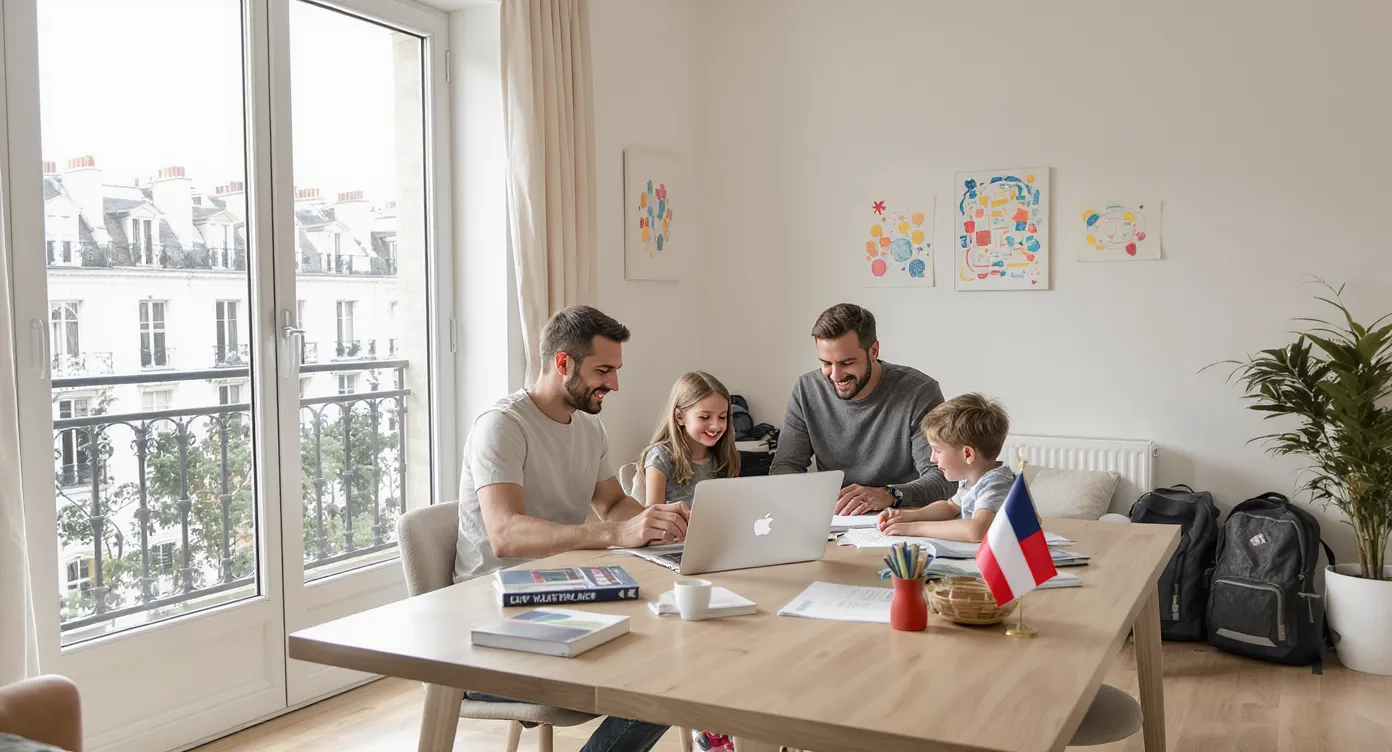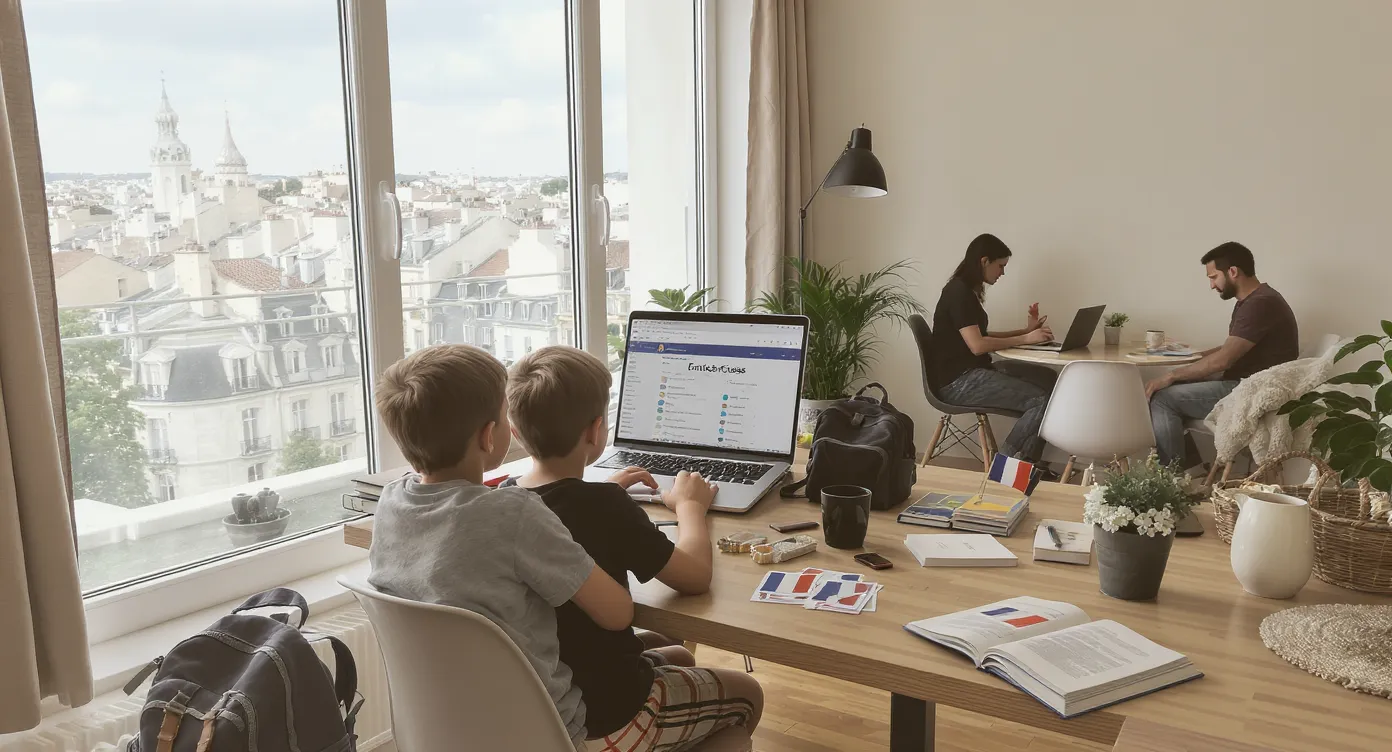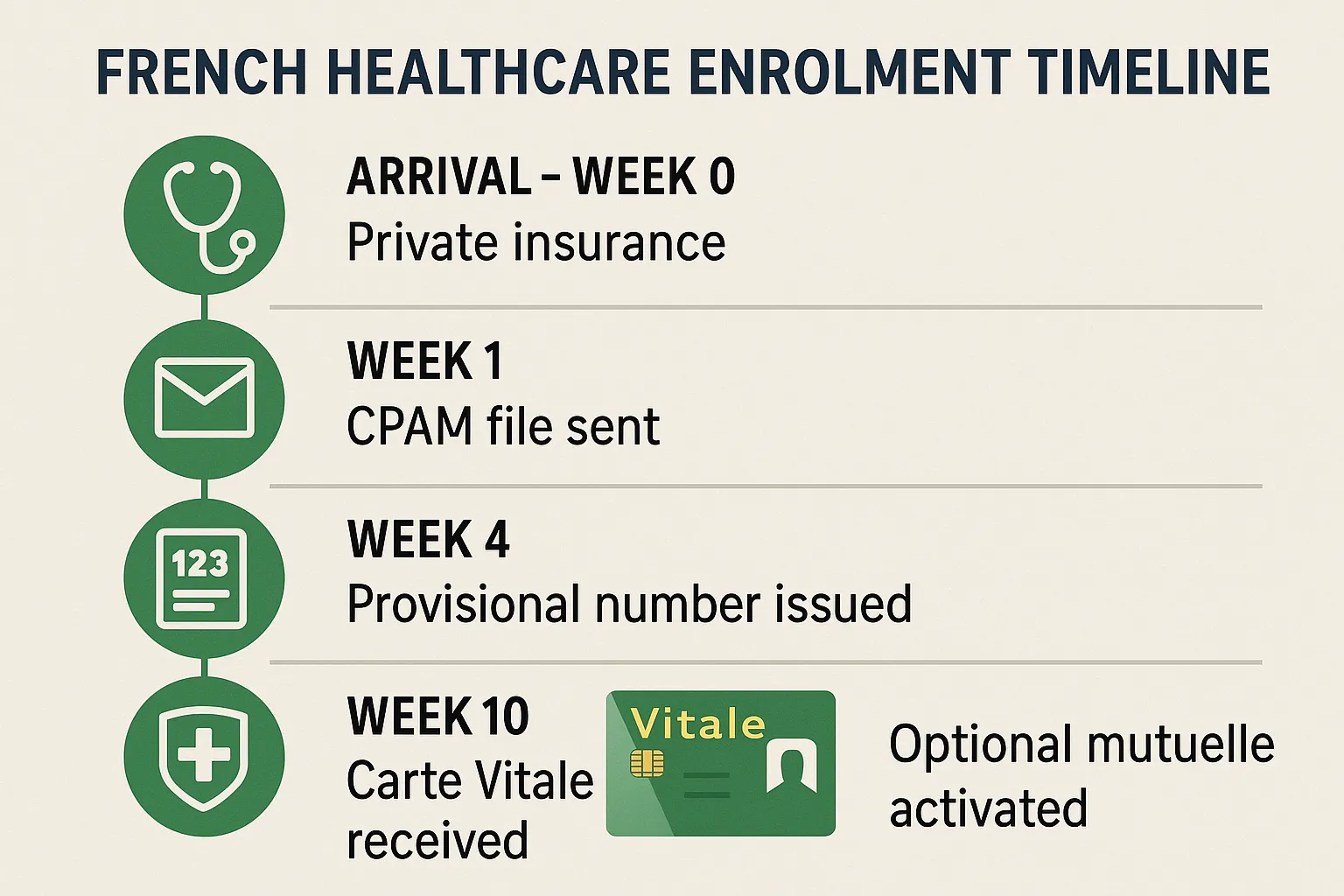French Immigration for Digital Nomads With Children: Schooling and Health

The global rise of location-independent work has pushed France onto the short list of family-friendly bases for digital nomads. Reliable broadband even in rural villages, easy rail links to the rest of Europe, and state-funded schools and healthcare make the country uniquely attractive when you are coding at dawn and organising homework by dusk. Yet parents quickly discover that moving to France with children involves far more than finding a co-working café. School enrolment rules, vaccination certificates, and the infamous CPAM registration all sit on the critical path to a smooth relocation.
This guide unpacks what digital nomads need to know in 2025 about schooling and health coverage for their kids—and how each decision meshes with the residence-permit strategy you choose.
1. Choosing the Right Immigration Status When You Have Kids
France does not offer a stand-alone “digital nomad visa”. Most remote workers enter under one of three existing tracks:
- Long-Stay Visitor Visa (VLS-TS « visiteur »). Good for families relying on foreign income and staying up to a year, renewable from inside France. Children receive dependent VLS-TS visas linked to the main applicant.
- Passeport Talent « Profession Artistique et Culturelle / Salarié en mission / Entreprise innovante ». A fit if you are employed by your own start-up or seconded by a foreign company. Family members qualify for the simplified famille accompagnante permit.
- Entrepreneur / Profession libérale Carte de séjour. Popular with freelancers who invoice French or EU clients and pay local social charges.
Why the choice matters for kids:
| Permit Type | Access to Public School | Access to CPAM/PUMA Health Cover | Typical Processing Time |
|---|---|---|---|
| VLS-TS Visitor | Immediate upon proof of local address | After 3 months of stable residence¹ | 6–10 weeks in 2025 |
| Passeport Talent | Immediate | Automatic for salaried holders; dependants piggy-back | 60 days avg (ANEF) |
| Entrepreneur | Immediate | Automatic after URSSAF affiliation | 3–5 months incl. URSSAF |
¹Article L.160-1 CSS grants every legal resident access to Protection Universelle Maladie (PUMA) after three months of “stable” stay.
ImmiFrance advisers routinely map schooling and health timelines against the permit route so that families avoid gaps—especially when they land in late summer and the academic year starts in early September.
2. Schooling Your Children: French Law and Your Options
2.1 The Legal Obligation
Under Article L.131-1 of the French Code of Education, schooling is compulsory from age 3 to 16, irrespective of a child’s nationality or parents’ immigration status. The Constitutional Council reaffirmed this right in Decision 2021-823 QPC, making it impossible for a mairie or rectorat to refuse enrolment because your residence card is still “in process”. (For undocumented cases, see our step-by-step guide Child Enrollment in French Schools Without Legal Status.)
2.2 Public School Enrolment: How It Works
- Obtain proof of address (lease, hotel invoice > 3 months, or official domicile certificate if you use a hosting family).
- Register at your local mairie for maternelle (ages 3–5) and école élémentaire (6–10). For collège and lycée, the rectorat handles placement.
- Prepare the documents most town halls request:
- Child’s passport and French entry visa or residence permit
- Parent’s ID (passport or residence permit)
- Birth certificate (long-form, translated by a sworn translator if not multilingual)
- Proof of address (< 3 months)
- Up-to-date vaccination booklet (see section 3.3)
- Receive the certificat d’inscription and school assignment. Take this to the head teacher to finalise admission.
Language support: Newly arrived non-Francophone pupils can join an UPE2A class (Unit for Incoming Allophone Students) for intensive French while following mainstream lessons. Allocation depends on an evaluation at the CASNAV centre.
2.3 Private and International School Choices
Parents who want continuity with an English-language curriculum—or more schedule flexibility for continued travel—often look at:
- French private sous-contrat schools. They teach the national curriculum but charge €1 000–€4 000 per year for extras.
- International schools approved by the AEFE network. Fees range from €8 000 in provincial cities to €25 000 in Paris.
- Fully online schools recognised by the Ministry (CNED réglementé). These allow you to keep moving while staying within French law.
Waiting lists for bilingual programmes can exceed a year, so families should start inquiries before applying for visas. ImmiFrance can issue a standard “proof of schooling intent” letter that helps during consular interviews.
2.4 Homeschooling While Travelling
France permits homeschooling (instruction en famille) but tightened rules in 2022. You must submit:
- An annual declaration to your mairie and rectorat before the new school year.
- A pedagogical plan justifying why your child cannot attend a public or private establishment.
Expect an inspector visit every one to two years. Frequent cross-border travel is not a valid reason on its own—you need a coherent educational project. Families mixing slow-mad life and periodic stays abroad often combine CNED distance courses with short on-site enrolments.

3. Navigating French Healthcare for Your Family
3.1 Understanding CPAM and PUMA
The French social security system reimburses 70 % of GP visits and a higher share for paediatrics and chronic-care acts. Coverage for children under 18 is free once they are attached to a parent’s number.
Remote workers who are:
- Salaried by a French entity are covered from day one via employer declarations.
- Self-employed (auto-entrepreneur or EURL) obtain a provisional numéro de sécurité sociale after registering with URSSAF, then finalise enrolment.
- Holding a visitor permit without French income can apply to PUMA after three months of continuous residence.
For the step-by-step dossier—including the 2025 document checklist—see Medical Coverage in France: Registering with CPAM as a New Visa Holder.
3.2 Bridging the First Three Months
Because reimbursements start only once CPAM validates the file, digital nomad families should budget for:
- Private travel health insurance that meets Schengen requirements (€30 000 coverage, repatriation).
- Top-up mutuelle after CPAM activation if you prefer zero out-of-pocket visits. Family plans cost from €70/month.
3.3 Vaccination Requirements for School Entry
Since 2018, eleven vaccines are mandatory in France for children born after 1 January 2018. Schools routinely ask for the vaccination booklet (carnet de santé) or a doctor’s certificate showing compliance:
| Vaccine | Doses Required Before Age 2 |
|---|---|
| DTP (diphtheria, tetanus, polio) | 3 |
| Pertussis | 3 |
| Haemophilus influenzae B | 3 |
| Hepatitis B | 3 |
| Pneumococcal | 3 |
| Meningococcal C | 1 |
| Measles-Mumps-Rubella | 2 |
If your child was vaccinated abroad, bring certified translations and ask a French GP to transcribe them into the carnet de santé. CPAM refunds this consultation once you are enrolled.
3.4 Telemedicine and Mobility
France’s Doctolib platform supports video consultations reimbursed at 70 %, a lifesaver when you are on a ski trip in the Alps yet still within French territory. When you cross borders, the European Health Insurance Card (EHIC) applies if you remain tax-resident in France. ImmiFrance can manage the EHIC request concurrently with your initial CPAM file so you travel worry-free.

4. Five Field-Tested Tips for Digital Nomad Parents
- Land in June, not August. Prefectures and mairies operate on skeleton staff in August. Arriving in early summer gives you six weeks to secure both enrolment and CPAM before classes resume.
- Use domiciliation services wisely. If you plan to change cities every few months, maintain a single legal address (domicile stable) for administrative mail. La Poste’s réexpédition permanente forwards the rest.
- Prioritise FranceConnect accounts. Many school canteen and CPAM portals now require FranceConnect+. Follow our Digital France Connect setup guide before you leave your home country, when you still have easy access to banking apps for identity verification.
- Sync permit renewals with school holidays. Renewals now occur fully online via ANEF, but biometrics capture may still require an in-person trip. Booking appointments for July or December avoids children missing classes.
- Archive everything digitally. Birth certificates, school reports, vaccination proof and rent receipts will all resurface in future prefecture files (10-year card, naturalisation). Scan and store them in an encrypted drive.
5. How ImmiFrance Can Help
Relocating as a digital nomad family means juggling three bureaucracies at once—prefecture, education authority, and CPAM—each with its own portal, timelines and French-only forms. ImmiFrance provides:
- Permit strategy sessions to pick the visa track that aligns with your children’s schooling calendar.
- Prefecture appointment monitoring so you secure slots before arrival.
- School enrolment kits with translated birth certificates and vaccination summaries accepted by mairies.
- CPAM filing and follow-up until every family member has a Carte Vitale in hand.
- Lawyer referrals if you face a refusal or an administrative bottleneck.
Families who use our bundled “Nomad + Kids” package in 2025 report an average six-week reduction in time to full administrative compliance compared with DIY filings.
Key Takeaways
- French law guarantees schooling from age 3 and healthcare after three months of residence, even for non-EU nationals.
- The residence-permit category you pick will determine how quickly your family can join the CPAM system and whether dependants need separate paperwork.
- Start school enquiries and vaccination translations before your visa appointment to avoid a last-minute scramble.
- Digital tools (FranceConnect, Doctolib, tele-consultations) make a nomadic lifestyle compatible with French bureaucracy—if set up early.
- Professional guidance from ImmiFrance can synchronise permits, schooling and health coverage, letting you focus on family life and billable hours.
Dreaming of coding from a Breton beach while your kids master French verbs? Book a free 20-minute call with an ImmiFrance adviser today and turn that travel mood board into a legally compliant reality.
